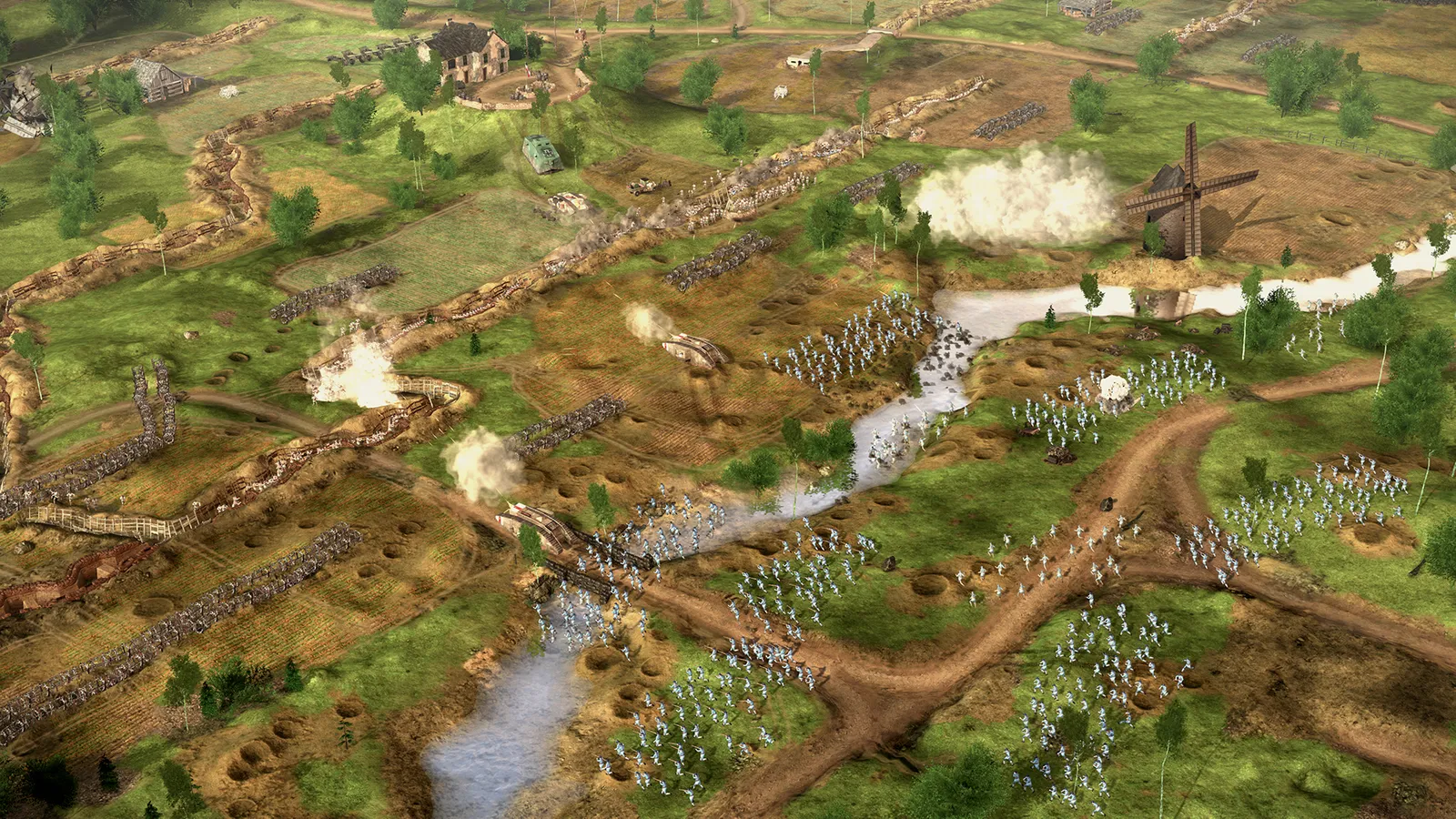The Great War: The WW1 video game that's eerily accurate
Video games have always borrowed from the past, but recent releases like The Great War: Western Front and Pentiment have taken historical detail to a new level. Just how important is accuracy in a world of entertainment, asks Andrea Valentino.

There are many images of World War One sewn into the popular imagination, but now video gamers are able to experience the conflict's Earth-churning intensity as if first-hand. Released on 30 March, The Great War: Western Front turns players into generals, mixing grand strategy with the slog of the trenches. Responsible for everything from organising troops to launching observation balloons, gamers can lead the fight from both sides of the wire – either as the Allies or Germany – using an aerial view of the battlefield and a large map of Belgium and France.
This is hardly the first game to use history as its frame. But it's clear that the team at developer Petroglyph Games took its setting seriously. "We wanted to create that authentic World War One experience," says Chris Becker, The Great War's lead designer, noting that Petroglyph worked with London's Imperial War Museum to make their product as "plausible" as possible. This partnership can be glimpsed in the game's canvas – and its smallest specifics. On a strategic level, players are encouraged to appreciate the attritional nature of trench warfare, each attack incrementally denting their army's resources and national morale. Zoom in, and they'll notice the buzzing of biplanes, and how every shell blasts soil up into the air.
Keeping precisely to the historical record may make less sense than conjuring an approximate snapshot of the past
Even more striking than their game's mud-splattered realism, however, is just how common Petroglyph's principles now are. Over recent years, historical accuracy has swept video games from action titles to murder mysteries, their developers leaning on a remarkable spread of primary sources; their audiences increasingly eager for mature forays into the history books. But if games like The Great War are ever more popular, they're still commercial ventures. To put it another way, even the most sophisticated game is there to entertain – and keeping precisely to the historical record may make less sense than instead conjuring an approximate snapshot of the past.
Video games have always borrowed from history. As far back as 1986, for instance, punters became pirates in the 18th-Century strategy title Pirates of the Barbary Coast. Around the turn of the millennium, Medal of Honour: Allied Assault let shooter fans relive the chaos of the Normandy landings. Speak to industry insiders, however, and you get the impression that history has lately elbowed its way to greater prominence. Where once it was mere window-dressing, history expert Joanna Katarzyna Nowak argues that recent games "really follow" the past.
Nowak is in an excellent position to explore these shifts. As the art historical consultant and concept art coordinator at Warhorse Studios, she was instrumental in the development of Kingdom Come: Deliverance, a role-playing title set in 15th-Century Bohemia. Releasing their product in 2018, the Czech developers received praise for the historical depth of their creation – a fact readily appreciated by anyone who's played it. At one point, gamers are tasked with giving a sermon inspired by Jan Hus, a Czech religious radical executed in 1415. Elsewhere, they can try their hand at archery, or learn to write from the local scribe. All this happens in a bewilderingly detailed game world. Cowl-necked traders jostle with peasants and priests. Churches soar, farmsteads squat and charcoal pits belch smoke into the sky.
Also released in 2018, Red Dead Redemption 2 (RDR2) brought players into the US of 1899, the music, newspapers and even ornithology of the age all exactingly revived. Yet if both games won leagues of admirers – RDR2 has so far sold 50 million copies – you're still left wondering how exactly the developers managed to encode the past in ones and zeros. Glance at footage of either game and their graphical fidelity, a universe away from the blocky, pixelated galleons of Pirates of the Barbary Coast, offers something of an answer. If technology is one factor here, however, Nowak is also keen to emphasise the accessibility of historical sources is another. As a student, she recalls having to painstakingly track down manuscripts in the library. While researching KCD, however, she could rely on high-quality online scans, each casting light on costumes, architecture and more.
Marrying entertainment and history
Certainly, some of the most dazzling historical games of recent times are far from conventional beauties. It may look like a glorified atlas, for example, but Crusader Kings III vividly evokes the throat-cutting drama of medieval politics from Lisbon to the Ganges. And though it mimics illuminated manuscripts, locking the player perspective in 2D, 2022's Pentiment is a Renaissance murder mystery that includes such period details as debates on transubstantiation and the appearance of mythical king Prester John in the protagonist's dreams.
There's obviously a market for such nerdiness: Pentiment has become a surprise hit since its release last November. And for some, that hints at a wider reason for the current glut of historically accurate games. Comparing RDR2 with the Western TV series Deadwood, Tore Olsson, an associate history professor at the University of Tennessee, Knoxville, argues that both typify the rising popularity of thoughtful, morally ambiguous history across media. RDR2 doubtless ticks that box: the game movingly portrays an outlaw fighting to maintain his soul in a bloodthirsty gang.
For Olsson, moreover, the success of games like RDR2 suggests that players themselves are changing too. Growing up in the 1990s, he tells BBC Culture that the video games of that era were "the domain of introverted young men like myself." Two decades on, their hobby increasingly transcends age and gender lines. With that in mind, and especially given America's growing self-awareness around its past, Olsson says it makes sense that the "sophistication and nuance" of games like RDR2 should prove so compelling. Other research seems to support this claim. As Dr Jacqueline Burgess at the University of the Sunshine Coast in Australia has found, 58% of players feel developers should minimise changes to the historical record when crafting their games.
Something can feel authentic to a person, but not actually be accurate – Dr Jacqueline Burgess
Studios, for their part, are clearly conscious of what audiences crave. The Assassin's Creed series may lack the accuracy of other games – a recurring plot point involves an ancient civilisation that artificially created humanity – but the developer has actively designed gameplay features with history in mind. Among other things, that includes a "discovery mode" feature, allowing players to wander historical cities from Ptolemaic Alexandria to Anglo-Saxon Winchester, along the way taking virtual lessons in ancient brewing and Alfred the Great. At the same time, Olsson has used RDR2 to teach his students, an innovation that's even led him to review the game for a prestigious academic journal.
In a broader way, however, the success of the Assassin's Creed franchise, now on its 12th instalment, may hint at the limits of marrying entertainment and history. Games are ultimately there to make money – and any title that sticks too faithfully to reality may struggle to do well. Quite aside from the plot, Burgess characterises Assassin's Creed: Black Flag, as a pirate title that turns the period's complex naval battles into a seafaring arcade. Other developers have proved flexible too. In RDR2, for instance, shootouts are far more exciting than their real-world counterparts ever were, while the nastiest laws and prejudices of the era are minimised. And if many games are happy to sacrifice accuracy for fun, others have been criticised for doing the opposite. Kingdom Come: Deliverance is a prime example here, with some players grumbling about the complexity of the swordplay, or how they're obliged to keep their protagonist rested and fed.
And if gamers clearly care about the past, few are professional historians like Olsson. That means they sometimes have a particular vision of history, even if that vision isn’t strictly true. "Something can feel authentic to a person," says Burgess, "but not actually be accurate." More to the point, developers are generally happy to appease these sensibilities. Despite lovingly recreating the Paris of the French Revolution, the developers of Assassin's Creed: Unity were careful to give Notre Dame its iconic spire, even though it was only built in the 19th Century. Importantly, the developers only tweaked the cathedral after testers felt it didn't look right.
Olsson, for his part, has noticed anachronisms in RDR2. By 1899, the American Frontier Wars had been won, and the (first) Ku Klux Klan suppressed. But both nonetheless feature, something he says could be about "capturing a mood" of 19th-Century America, even if the particulars aren't quite true. You sense a similar philosophy at Petroglyph Games. "For the player," Becker says, "the engagement comes through the cause and effect of their actions," implying that even marginal victories shouldn't feel quite as hollow as those of their historical forebears. Considering just how wretched the Great War really was, that's surely just as well.
-bbc







